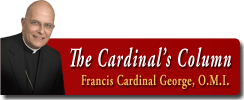 |
 |
|||||
 |
 |
 |
 |
 |
||
| February 2, 2003
Religion and healing: Last week, a canonical hearing was held to determine if a miracle took place in Chicago in 1972. A young man was severely injured in a train accident and was clinically dead when brought to the hospital. His desperate family prayed to God through the intercession of a religious sister who had died in Chicago in 1918. The young man revived and lived until 1997. The doctors who gave their testimony at the hearing last week explained that the healing of the young man in 1972 was beyond the power of medical science to explain. Those who took their testimony felt that their own faith was strengthened in examining the story of this miracle. The religious sister was Mother Mary Teresa Dudzik, the founder of the Franciscan Sisters of Chicago, who have their motherhouse in Lemont. Mother Mary Teresa came to Chicago from Poland and founded her religious community in 1894. She gave her life to God in religious life and served others most generously until her death. Her sisters continue to live and serve here. Her reputation for holiness is the reason why people have prayed privately to her since her death. If the miracle of the healing of the young man in 1972 is judged authentic, Mother Mary Teresa may be declared Blessed, and we could pray publicly to her. What is the connection between healing and holiness? Why are all the miracles examined in the process of declaring someone a saint instances of physical healing? Usually, we think of miracles as exceptions to the laws of nature and therefore evidence of divine power in action. This is true, but there’s another way to look at miracles. Miracles are evidence of how the world was meant to be by God before sin entered into creation. God created our first parents to know, love and serve him. The world was oriented to this purpose and will be again when God reveals how things are to be for all eternity at the end of time. Miracles are eternity breaking into time and are evidence of God’s will for our salvation. We have gotten used to the only world we know, and we assume that the present world is “normal.” But the really normal is disclosed in what we call miraculous. Saints know this; saints are themselves evidence of God’s universal call to holiness. Jesus is our Savior. He restores each of us and the world itself to God’s original plan. In the Gospels, Jesus doesn’t just teach; he also heals. The redemption Christ achieved is a renewal, a restoration, a re-creation of the whole human being. Jesus’ miracles are a pledge and foretaste of that complete restoration. In them, God touches the entire human condition and begins to gather all humanity into his kingdom. Creation out of nothing is the first great “miracle,” but even more miraculous is God’s transforming the evil of sin into the goodness of holiness. In the new creation, the life of grace, God gently draws together the torn tissues of humanity and heals the diseased human condition caused by the fall. Even natural religion, not founded on historical revelation, finds God’s presence in acts of healing. Religious leaders among tribal peoples are medicine men or shamans, healers. As the Church teaches because Jesus taught, so the Church heals because Jesus healed. Christ uses the sacraments to heal our sinfulness and restore God’s likeness in us and to shape the believer into the image of Christ himself. Christ heals most clearly in the sacrament of the anointing of the sick which, along with Penance and the Eucharist as Viaticum, is also the sacrament of the dying. Baptism and its seal in Confirmation first give us the new life which will be ours beyond death. The sacraments of Penance and the Eucharist make us whole and one in Christ throughout our journey in this life. The sacraments heal. Continuing the healing ministry of Jesus, the Church cares for the sick in Catholic hospitals and medical centers. Some of our parishes have parish nurses, and people begin then to understand that every parish is a place of healing as well as a place for instruction in the faith and for worship of God. Priests who visit the sick regularly are appreciated by the faithful, and very often a priest is asked to pray for sick people. Parishes and religious congregations rightly organize prayers for the sick, mention them at Mass, visit them at home and in the hospital. Miracles of healing are part of the life of the Church both in well documented cases at shrines like Lourdes or in a process of canonization of a saint and also in everyday situations, when the Church and a family and friends implore the healing power of Christ for someone they love. Each February 11, the Feast of Our Lady of Lourdes, the whole Church celebrates the World Day of the Sick. All of us know people who are sick. All of us should pray for them and, especially, for the sick who have no one to pray for them. The Church gives us this special day to draw us into prayer every day for those who are ill in body and soul. To your own list this February 11, I would ask you to add the name of Bishop Edwin Conway, who will be undergoing an operation for cancer sometime soon. All the sick of the Archdiocese are in my own prayers at Mass each day. God bless you. Front Page | Digest | Cardinal | Interview | Classifieds | About Us | Write Us | Subscribe | Advertise | Archive | Catholic Sites | New World Publications | Católico | Directory | Site Map |
|
||||||||||
